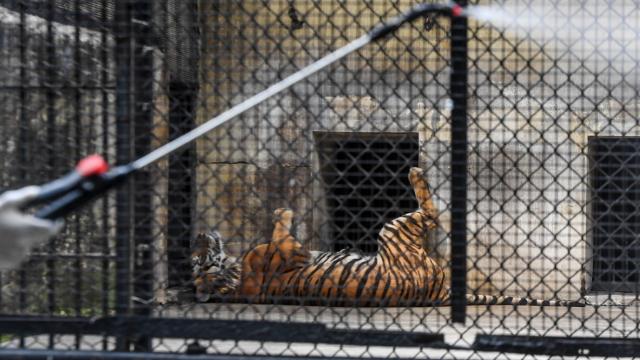Over the weekend, four tigers at the Bronx zoo tested positive for covid-19. The weird occurrence raised questions about the zoonotic transmission of covid-19. Did Joe Exotic have anything to do with this? (Probably not). Did the tigers contract the virus from human contact? Can the tigers infect humans? How can we limit the spread of viruses between people to animals?
We don’t know exactly how the tigers contracted the coronavirus, but we do know that it’s zoonotic disease, meaning it’s caused by a bacteria, parasite, or in this case, a virus that spreads from animals to humans. New research has found that to limit “virus spillover” of these illnesses, we should stop messing with animals’ natural habitats.
In a paper published in the journal Proceedings of the Royal Society B on Tuesday, researchers found that the risk for viruses to spread to humans from animals increases when we exploit wildlife through land use practices, agriculture, and hunting.
“Spillover of viruses from animals is a direct result of our actions involving wildlife and their habitat,” lead author Christine Kreuder Johnson, project director of USAID PREDICT and director of the epicentre for Disease Dynamics at the University of California’s One Health Institute, said in a statement. “The consequence is they’re sharing their viruses with us.”
Removing animals from their natural habitats can stress them out, which increases the risk that those creatures will spread diseases. And when humans spend time around those stressed animals—whether that’s on a farm or out hunting—we risk exposure to high viral loads.
The authors identified 142 cases of zoonotic viruses spreading to people. Then, using the International Union for Conservation of Nature’s Red List of Threatened Species, they teased out patterns in the way those species have been affected by human action. The study traced half of the new diseases that animals transmitted to humans after 1940 to hunting, trade, habitat degradation.
The researchers found that domesticated mammals—including livestock like cows and pigs as well as pets like cats and dogs—host the highest number of viruses that can be shared with people. In fact, these domestic species carry eight times more of these viruses than wild mammal species. Wild animals that have adapted well to human civilisation and most often live in urban centres, such as rodents, bats, and primates, also often carried zoonotic diseases.
The study also found that among threatened and endangered species, zoonotic viruses were far more common among those whose habitats human had directly destroyed or degraded. Wildlife whose populations declined due to hunting, trade, and human occupation were more than twice as likely to carry zoonotic viruses compared to those threatened for other reasons, such as the changing climate.
That in turn increased the likelihood of spillover into humans. That’s troubling, because species with declining populations are also more likely to be directly monitored by humans trying to bring about their population recovery, which also puts them into greater contact with people.
“The study by Christine Kreuder Johnson and colleagues highlights the importance of rethinking our relationship with wild animals and wild places and most importantly the contact areas between them,” Christian Walzer, executive director of the Wildlife Conservation Society’s Wildlife Health Programs, told Earther. “The study provides new evidence on how the conservation of wild species and their respective environments can create global health wins and support the mitigation of future epidemics and pandemics.”
